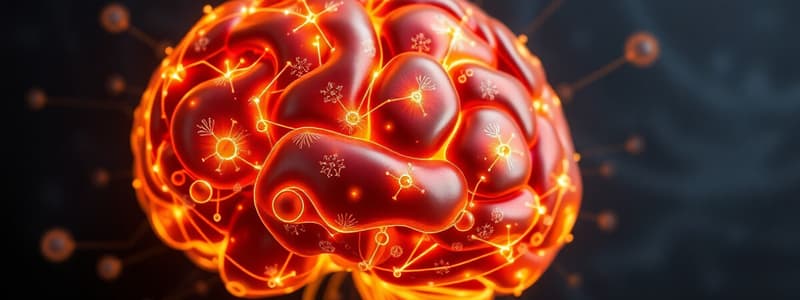Podcast
Questions and Answers
Which of the following statements accurately defines thinking?
Which of the following statements accurately defines thinking?
- A simple process of understanding information.
- A process that requires external stimuli to operate.
- A complex, internal mental process that involves manipulating and analyzing information. (correct)
- A form of memorization and repetition.
Mental images can only represent tangible objects.
Mental images can only represent tangible objects.
False (B)
What are the steps of problem-solving as described in the content?
What are the steps of problem-solving as described in the content?
- Identify the problem, 2. Represent the problem, 3. Plan and set sub-goals, 4. Evaluate possible solutions, 5. Select and execute a solution, 6. Assess the outcome, 7. Rethink for future improvements.
The type of reasoning that applies a general statement to a specific instance is known as __________ reasoning.
The type of reasoning that applies a general statement to a specific instance is known as __________ reasoning.
Match the following types of reasoning with their definitions:
Match the following types of reasoning with their definitions:
What encapsulates the term 'functional fixedness'?
What encapsulates the term 'functional fixedness'?
Decision-making does not involve evaluating costs and benefits.
Decision-making does not involve evaluating costs and benefits.
Name one characteristic of creative thinking.
Name one characteristic of creative thinking.
The process of reaching a conclusion based on a general rule is known as __________ reasoning.
The process of reaching a conclusion based on a general rule is known as __________ reasoning.
Which of the following processes is specifically aimed at overcoming obstacles?
Which of the following processes is specifically aimed at overcoming obstacles?
Flashcards
What is thinking?
What is thinking?
Thinking is a complex mental process that involves manipulating information from the environment. It's goal-directed and helps us solve problems, make decisions, reason, and be creative.
What are mental images?
What are mental images?
Mental images are like pictures in your mind. They represent sensory experiences, like remembering a specific scene or object.
What are concepts?
What are concepts?
Concepts are categories in your mind that group similar objects, events, or ideas together. They help us organize knowledge and think efficiently.
What is problem-solving?
What is problem-solving?
Signup and view all the flashcards
What is mental set?
What is mental set?
Signup and view all the flashcards
What is functional fixedness?
What is functional fixedness?
Signup and view all the flashcards
What is deductive reasoning?
What is deductive reasoning?
Signup and view all the flashcards
What is inductive reasoning?
What is inductive reasoning?
Signup and view all the flashcards
What is analogical reasoning?
What is analogical reasoning?
Signup and view all the flashcards
What is creative thinking?
What is creative thinking?
Signup and view all the flashcards
Study Notes
Thinking
- Nature of Thinking:
- Thinking is complex, internal processing of environmental information.
- It's goal-driven and crucial for cognitive tasks like problem-solving, decision-making, reasoning, and creativity.
- Thinking relies on mental representations:
- Mental Images: Sensory experience representations (e.g., visualizing a scene).
- Concepts: Grouping similar objects, events, or ideas based on shared characteristics.
Building Blocks of Thought
- Mental Images: Visualizing experiences or objects, like remembering details of a map or scene.
- Mental images are mental representations of sensory experiences.
- Concepts:
- Organize and streamline thinking.
- Classify objects/events based on shared characteristics.
Processes of Thinking
Problem Solving
- Definition: Finding solutions to overcome obstacles to meet a goal.
- Steps:
- Identify the problem
- Represent the problem clearly
- Plan and set sub-goals
- Evaluate potential solutions
- Select and execute a chosen solution
- Assess results and adjust approach.
- Obstacles:
- Mental set: Employing previously successful methods inappropriately when new approaches are suitable.
- Functional fixedness: Inability to see new uses for familiar objects or ideas.
- Lack of motivation/persistence: Failure to stay engaged with the solution process.
Reasoning
- Definition: Drawing conclusions and making inferences.
- Types:
- Deductive: General statement to specific conclusion (e.g., All cats are animals, Mittens is a cat, therefore Mittens is an animal).
- Inductive: Specific instances to a general conclusion (e.g., observing patterns).
- Analogical: Drawing comparisons to solve problems.
Decision-Making
- Definition: Choosing between options based on evaluating costs and benefits.
- Judgment: Forming opinions and conclusions during decision-making.
Creative Thinking
- Definition: Generating novel or original ideas.
- Characteristics:
- Novelty, originality, and appropriateness.
- Types:
- Convergent: Finding one correct answer.
- Divergent: Generating multiple solutions.
- Abilities involved: Fluency, flexibility, originality, and elaboration in the creative thought process.
- Process:
- Preparation, Incubation, Illumination (insight), Verification.
- Strategies for Enhancing Creativity: Brainstorming, questioning, and exploring new perspectives.
Studying That Suits You
Use AI to generate personalized quizzes and flashcards to suit your learning preferences.




